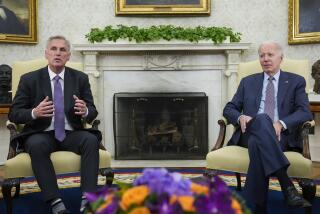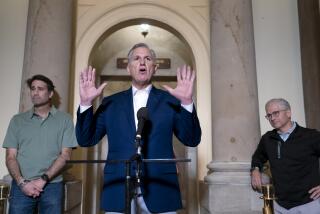Hopes hang on bailout tweaks
- Share via
WASHINGTON — Senate leaders reached consensus late Tuesday on a revised $700-billion financial rescue plan that they hoped would clear the chamber in a vote today and ward off another upheaval in global markets that could threaten economies here and abroad.
Presidential nominees Sens. John McCain (R-Ariz.) and Barack Obama (D-Ill.), along with Obama’s running mate, Sen. Joe Biden (D-Del.), were expected to fly to Washington for the vote, a move that could increase the pressure on lawmakers to back the measure.
Spurred by banking regulators, the Senate bill includes a big hike in the limit on federally insured deposits to $250,000 from the current $100,000 cap. The bill also includes popular tax-relief measures. An effort is underway to add some accounting relief for companies that have to revalue mortgage-related holdings.
“We’re facing a choice between action and the real prospect of economic hardship for millions of Americans,” President Bush said.
Leaders expect the Senate to vote this evening and the House, which dealt a crushing blow Monday to bailout hopes by defeating the bill, to take up the issue as early as Thursday.
“I don’t think you’re going to see a lot of change in the bill we put up,” a member of the House Democratic leadership said, speaking on condition of anonymity because of the delicacy of the negotiations.
“We’ll make tweaks both for Republicans and Democrats, but we’ll probably have on the floor a bill that doesn’t look very different,” the official said.
The new version also is likely to include stronger protections for homeowners facing foreclosure and possibly language sought by Republicans to discourage excessive government intervention in markets, the official said.
Hope for further congressional action pushed the markets higher Tuesday. The Dow Jones industrial average soared nearly 500 points, recouping much of the 777-point loss on Monday, the largest single-day drop, after the House vote.
Despite an eerie, morning-after quiet that enveloped Capitol Hill because of a Jewish holiday, leaders’ offices were bombarded by critics on the left and right with demands for new approaches to relieve the financial crisis.
But strategists in both major parties opted for a much less drastic approach to avoid the protracted wrangling and new shocks to global markets that could come if they started over from scratch. They decided to try attracting the relative handful of votes needed for approval by offering modest concessions such as the temporary boost in deposit insurance and a possible easing of accounting rules.
Hanging over their efforts was the fear that, with millions of Americans angry over what they see as an undeserved bailout of wealthy investors, the country could slide into an economic debacle before they could muster public support for corrective action.
Top Senate Democrats and Republicans appeared together on the Senate floor and pledged to work to pass the measure before Congress adjourns for the fall campaign.
“Despite yesterday’s setback in the House of Representatives, this continues to be our No. 1 goal,” Senate Majority Leader Harry Reid (D-Nev.) said.
In a further attempt to build support in the Senate, leaders agreed Tuesday to attach to the bailout package a Senate-passed tax measure that would provide incentives for developing renewable energy, shield an estimated 20 million Americans from paying the alternative minimum tax and extend a number of expiring tax cuts for businesses and families.
“I said from the beginning that the administration’s original financial plan focused too much on Wall Street and not enough on Main Street,” said Sen. Max Baucus (D-Mont.), chairman of the Senate Finance Committee.
Although they may help win passage in the Senate, the added provisions face an uncertain future in the House and could further delay agreement on rescue legislation.
House Minority Leader John A. Boehner (R-Ohio) welcomed calls from both major presidential nominees for raising the cap on insured deposits, noting that it had been proposed by House Republicans during negotiations but rejected by Democrats.
The broad goals of a rescue plan are to help banks and other financial institutions deal with the billions of dollars in underwater mortgage-backed securities that now clog their books and endanger their viability, as well as to thaw frozen credit markets that businesses need to conduct normal operations.
Thus far, both problems have been most clearly visible in the world of global markets and such huge financial institutions as mortgage-finance giants Fannie Mae and Freddie Mac, but economists warn that problems will quickly spread to the rest of the economy, raising the likelihood of a severe recession, more job losses and erosion of personal financial security.
And there was no shortage of suggestions for new ways to tackle these problems: Suspend the capital gains tax and reduce the corporate income tax, suggested Sen. Jim De- Mint (R-S.C.). Create an emergency financial crimes office, said Rep. Marcy Kaptur (D-Ohio), “to investigate any criminal acts that led to this crisis.”
Enact another stimulus package that includes unemployment benefits, food stamps and infrastructure spending, some Democrats urged.
But the two ideas that attracted the most serious attention were raising deposit insurance limits and modifying accounting rules for companies holding securities that currently have little or no value.
Sheila C. Bair, chairwoman of the Federal Deposit Insurance Corp., said “it would be helpful” if Congress gave the agency the authority to temporarily boost the size of bank accounts covered by the insurance. The FDIC insures individual accounts up to $100,000, joint accounts up to $200,000 and retirement accounts up to $250,000.
“Insured deposits remain fully protected and the FDIC guarantee remains rock solid -- the same as it has been for 75 years,” she said. “Unfortunately, there is an increasing crisis of confidence that is feeding unnecessary fear in the marketplace.”
Expanding the coverage would also provide additional cash for banks to make loans. Bair did not say how high she would like to raise the insurance limit, but Democratic presidential nominee Barack Obama and Republican presidential nominee John McCain both called Tuesday for it to be raised to $250,000.
One downside to raising the cap is that it could add to taxpayers’ costs if the problems that banks are now experiencing grow worse. Although the FDIC’s deposit insurance fund is paid through premiums charged to banks, taxpayers would have to step in if the fund were quickly depleted through a series of major bank failures.
“We don’t need to put the taxpayers on the hook for any more than we are,” said Kenneth H. Thomas, a lecturer at the University of Pennsylvania’s Wharton School who has studied deposit insurance.
The accounting-rules issue was even more complex and laden with uncertainties.
The rules, put in place last November to help investors understand the value of complicated assets, have been sharply criticized by some lawmakers and conservative analysts, such as former House Speaker Newt Gingrich, as exacerbating the financial crisis.
The so-called mark-to-market rules require firms to revalue such long-term assets as mortgage-backed securities based on sale prices in the open market -- a requirement meant to prevent companies from pumping up their balance sheets with unrealistic valuations of such securities.
Critics argue that, in the present mortgage crisis, the rules make firms look weaker than they are by tying asset values to sales made by struggling institutions desperate for cash. On Thursday, a bipartisan group of 65 members of Congress called on Securities and Exchange Commission Chairman Christopher Cox to suspend the rules immediately.
The Bush administration has opposed suspending the rules, arguing that doing so could hurt investor confidence by making it difficult to know the value of companies’ holdings.
But on Tuesday the SEC and the Financial Accounting Standards Board sought to ease any negative effects by clarifying that the rules allow accountants to discount “fire sale” prices when trying to determine the fair value of assets.
--
jim.puzzanghera@latimes.com
nicole.gaouette@latimes.com
More to Read
Get the L.A. Times Politics newsletter
Deeply reported insights into legislation, politics and policy from Sacramento, Washington and beyond. In your inbox twice per week.
You may occasionally receive promotional content from the Los Angeles Times.












